Keywords
Menstruation, dietary habits, skipping breakfast, premenstrual syndromes, menstrual disorders
Introduction
Eating poorly or well can make a big difference on both the physical and mental aspects of the body. Eating healthfully can also boost the mood and lower the stress levels. Mental health is much more stimulated with body fulfilled and running smoothly [1-3]. Dietary habits are fundamental factors that influence human life styles and individual quality of life. Additionally, dietary habits in young women may determine their quality of life in subsequent middle or old age and should be evaluated from the perspective of total benefit throughout the whole life [4-6].
Menstruation is defined as the periodic discharge of blood, mucus, and cellular debris from the uterine mucosa. The average length of menstrual cycle is 28 days with a normal range 21 to 35 days. The normal duration of bleeding is 5 to 7 days with a normal range of 3 to 7 days. The average blood loss during menses is 35 ml with normal range of 20 to 80 ml [7-9]. The menstrual cycle is mainly regulated by the hypothalamus, in which gonadotropin releasing hormone (Gn-RH) is released in pulses to stimulate pituitary gonadotropes to secrete follicle-stimulating hormone (FSH) and luteinizing hormone (LH). These gonadotropins in turn promote follicular development with ovulation and corpus luteum formation in the ovary, inducing steroid hormone production. The frequency of ovulation gradually increases as puberty progresses, but it is common for 25-50% of adolescents still be anovulatory 4 years after menarche [5,10].
The World Health Organization (WHO) reports that 18 million women aged 30–55 years perceive their menstrual bleeding to be excessive. Such disorders also have economic consequences in terms of health care costs [11-13]. Irregular menstruation is one of the positive clinical symptoms which predict dysfunction of the hypothalamic-pituitary-ovarian axis. Premenstrual syndrome is a multifactorial syndrome that affects adolescent girls with a high frequency. This syndrome is characterized by the manifestation of psychological disorders such as irritability, depression, and mood swings and/or somatic complaints including abdominal bloating, peripheral edema, general fatigue and acne before menstruation. These symptoms are recurrent according to menstrual cycles and rapidly disappeared just after the onset of menstruation [5,13,14]. Changes in food habits can cause inadequate intake of calories, micronutrients, unsaturated fat, phytestrogens and fiber as well as increasing environmental toxins. Furthermore, these food habits increase risk due to the intake of food additives, anti-oxidants, processing agents and sweeteners, which have been demonstrated to be harmful to human health. These factors are speculated not only to influence the present lifestyle, but also to induce gynecologic disorders such as dysmenorrhea and irregular menstruation [4,15,16]. Nutritional deficiency is considered one of the important factors that induce hypothalamic-pituitary-ovarian dysfunction. Evidence suggests that breakfast consumption may improve cognitive function related to memory, test grades, and school attendance. Breakfast as a part of a healthful diet and lifestyle can positively impact children's and young adults? health and wellbeing [17].
Daily eating habits significantly influence menstrual function in young women and several studies reported that; vitamin deficiency or hypoglycemia can induce premenstrual syndromes in which patients complain of irritability, constipation and edema several days before the onset of menstruation [18-20]. Very recently it was confirmed that the frequency of irregular menstruation was increased in young women who were currently on a diet and found out that; the intensity of dysmenorrhea was high in those with a history of dieting in adolescence, suggesting that diet in adolescence has long-lasting adverse effects on reproductive function in young women [21].
From clinical experience there is great evidence concerning the effect of diet and breakfast consumption on the woman health in general and reproductive function in a specific manner. Menstrual cycle is a major concept of female reproductive system in addition, there is increasing attention paid to the adverse effects of skipping breakfast and menstrual regularity, pain, and premenstrual syndromes. Therefore, the current study attempts to investigate this issue.
Aim
The aim of the present study was to examine the effect of breakfast skipping on menstrual cycle among young females.
Method and Material
The present study was carried out with the aim of examining the effect of breakfast skipping on menstrual cycle among young females.
Research hypotheses
1- The girls who have breakfast meal have regular cycle than those who do not.
2- The girls who have breakfast meal have less menstrual pain (dysmenorrhea), and less premenstrual syndromes than those who do not.
Research design
The cross sectional descriptive design was used in the current study.
Sample
A convenient sample of 300 girls of young females were selected from faculty of nursing in Menoufiya University - Egypt.
Inclusion criteria
The girl should meet the following criteria; young female from 17- 22 years old, not use contraception methods and having no menstrual disorders.
Tools
The tools used for data collection was designed by the researcher based on review of pertinent literature and being revised by subject area experts. Face validity; was determined by colleagues from the same department at Menoufiya University who reviewed this instruments and judged it to measure what intended to be measured . Experts were also asked to judge the items for their adequacy (content validity). Reliability was assessed twice by applying the tools on 5 women who were excluded from the study (pilot study). The reliability tool was tested by test re-test reliability and it was (0.78). The tools were an interviewing questionnaire that contained many portions; part I contained; sociodemgraphic data (e.g. age, academic level, social history, family income and family history). Part II contained; menstrual data (e.g. age of menarche, menstrual regularity, dysmenorrhea, about 12 items of premenstrual syndromes, and menstrual problems ….etc.). part III contained; dietary habits (e.g. number of diets per day, the meal neglected, compliance of breakfast, time of breakfast meal and type of breakfast if it was home food or fast food).
Procedure
The data collected from the female students who gave oral consent about participating in the study. They were informed that; participation in the study was voluntary and any data they give was confidential after explaining the purpose of study to them. They filled the interviewing questionnaire in about 15 to 20 minutes. Data collection took about 4 months ( from February 2013 to May 2013). The researcher met the female students two times per week to fill the questionnaire. Analysis of the findings was carried out using SPSS software package version 17. It focused on the participants’ demographic characteristics, menstrual history, premenstrual syndromes, menstrual disorders, dietary history and the relationship between the skipping of breakfast and premenstrual syndrome and menstrual problems. The analysis was performed by obtaining descriptive statistics, frequencies and percentages for sample characteristics.
Human Rights and Ethical Considerations
The subjects were chosen after their informed consent was obtained to participate in the study. The researcher also reassured the subjects that their privacy would be protected, and any obtained information would be strictly confidential.
Results
Table 1; shows the sociodemographic characteristics of the sample. It demonstrates that, the range of age is 17-22 years (mean age 20.05±1.62). More half of the sample’ (53.3%) height was between 150-160 cm. About (57%) of sample weighed (51- 60kg). About two thirds of the sample (66.3%) have normal body mass index (BMI). The academic year of the sample were 22.7% from first year of nursing student, 25.3% from second year, 14.3% from third year, 25% from fourth year and 12.7% from internship year. Regarding to marital status 93% from the sample was unmarried. The table show the family income of the sample which is 48% was law income, 46% was moderate and 6% was high.
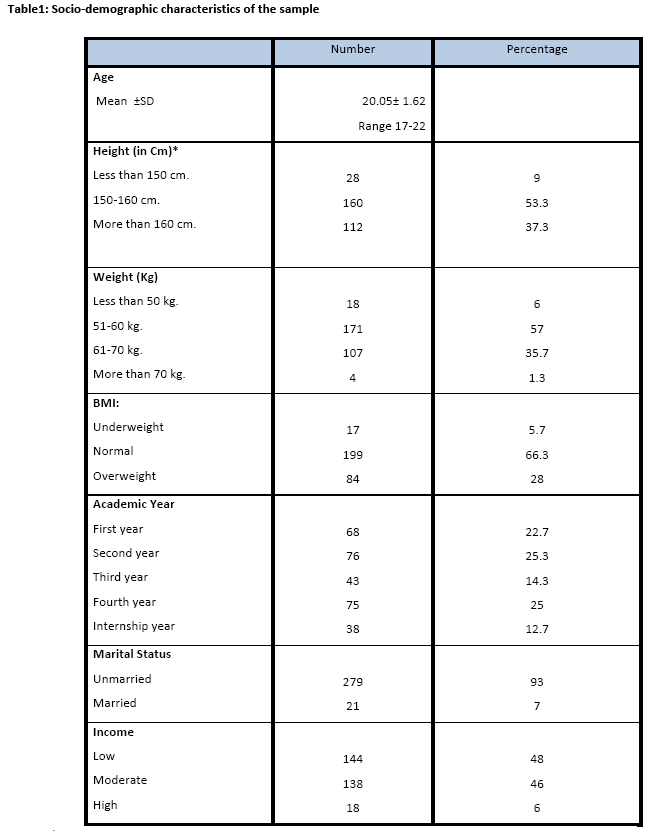
Table 2 demonstrates that; 74% of sample have no family history regarding hypertension, diabetes mellitus (DM), liver diseases, heart diseases, epilepsy and tumors. About four quarters of the sample (80%) were free from anemia, but only 20% of sample complain from anemia.
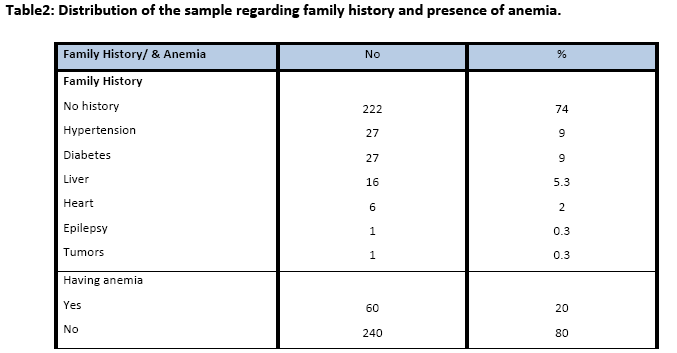
Table 3 shows that; about half of the sample’s (49.3%) age of menarche was between 10-12 years while (41.3%) were between 13-15 years of age and 9.3% were above 15 years old. Also, this table demonstrates that ( 85%) of the sample had regular cycle, but only 15% had irregular cycle. Regarding pain during menstruation this table shows that about two thirds of the sample (64.3%) complain from pain with menses while (35.7%) do not complain from such pain. Regarding the duration of menses, this table illustrates that; the majority of the sample’s (85.7%) duration ranged between three to seven days. Additionally, this table shows that; more than two thirds of the sample had moderate menstrual flow (72.3%). About (78.7%) of the sample’s menstrual consistency was without clots.
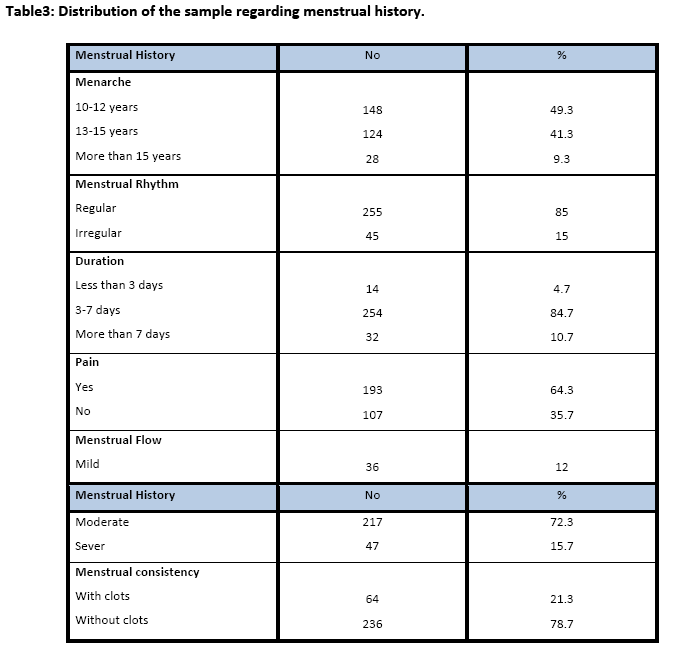
Table 4 illustrates the distribution of the sample regarding the premenstrual syndromes; a high percentage of the sample complain from premenstrual syndromes, premenstrual abdominal pain (69.7), premenstrual back pain (66%), premenstrual abdominal distension(69.3%,), premenstrual breast tenderness(69%), premenstrual depression(65.7%,), premenstrual anorexia(60%), premenstrual nausea(67%), premenstrual vomiting(63.7%), premenstrual insomnia(67.7%,), premenstrual cramps(68%) and premenstrual psychological disturbance (68.7%). while about half of the sample (49.7%) complain from premenstrual lack of concentration.
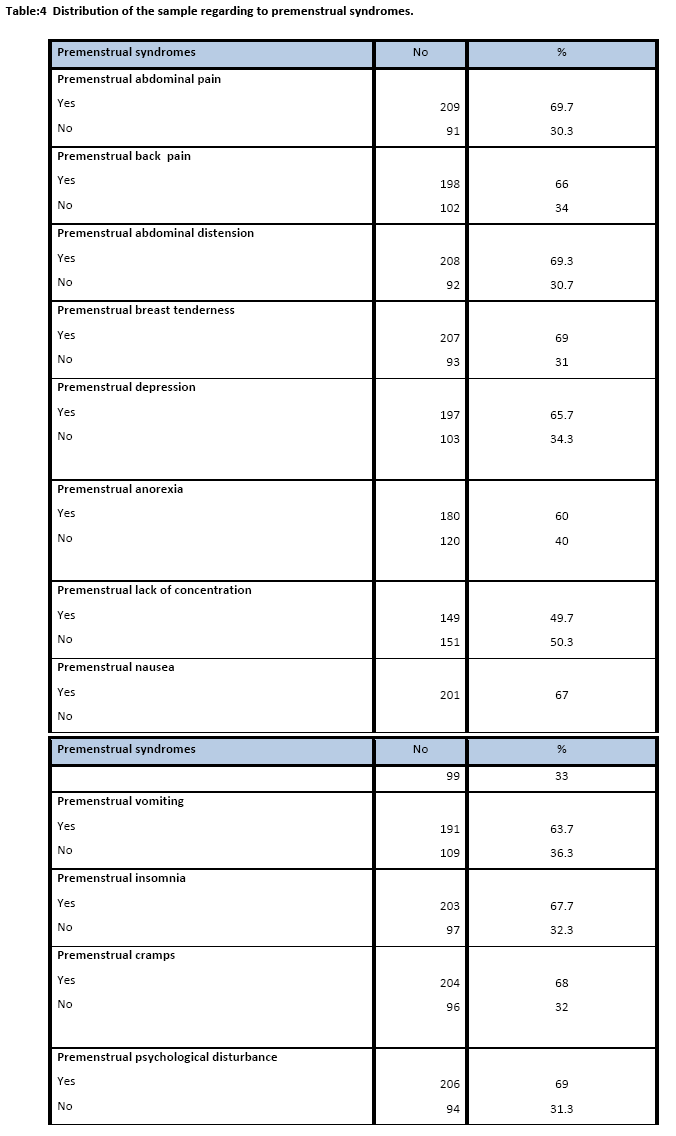
Table 5 shows that; the majority of the sample (80%) take two meals only per day. More than two thirds of sample (72.7%) neglect or skip the breakfast meal. The majority of them 46.9% rarely have breakfast from home made food. And, about 60.9% take breakfast meal from fast food (take away food). Also, about (78.7%) take the first meal/breakfast at the lunch time.
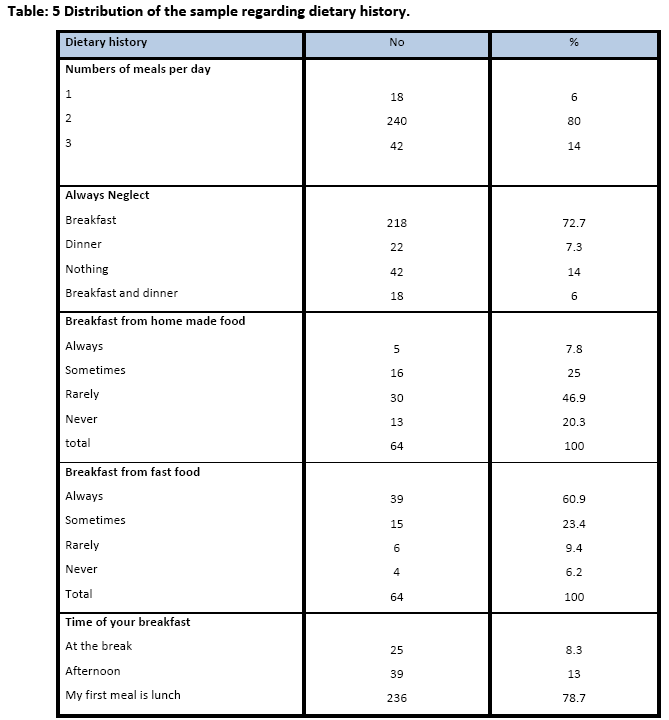
Table 6 shows statistically significant difference regarding the duration of menstrual cycle (p=0.016). But, there is no statistically significant difference regarding other items of menstrual history in both groups of the study.
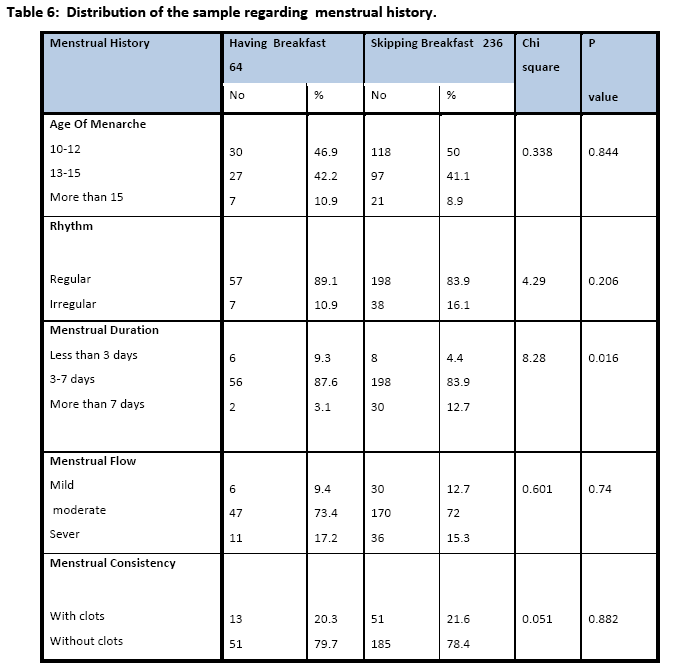
Table 7 shows statistically significant difference regarding premenstrual abdominal pain, premenstrual anorexia and premenstrual cramps between group one who have breakfast and group two who skip breakfast (p=0.035, 0.016, 0.035 ) respectively. But, there was no statistically significant difference regarding other items of premenstrual syndromes.
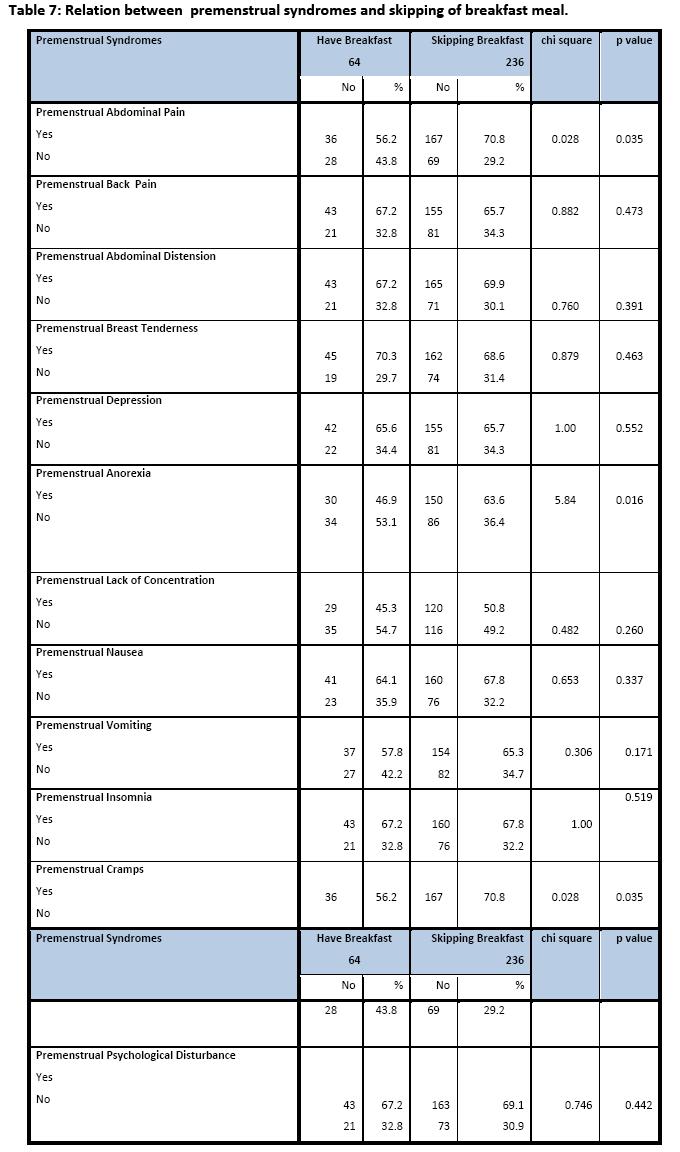
As shown in table 8, there is a statistically significant difference between the two groups of the study sample regarding the occurrence of dysmenorrhea and oligomenorrhea (p= 0.035, 0.045) respectively. Dysmenorrhea and oligomenorrhea were more in group two who skipped breakfast, but there is no statistically significant difference regarding the other items of menstrual disorders. Additionally, no one complains from secondary amenorrhea in group one who take breakfast compared to 1.3% in group two.
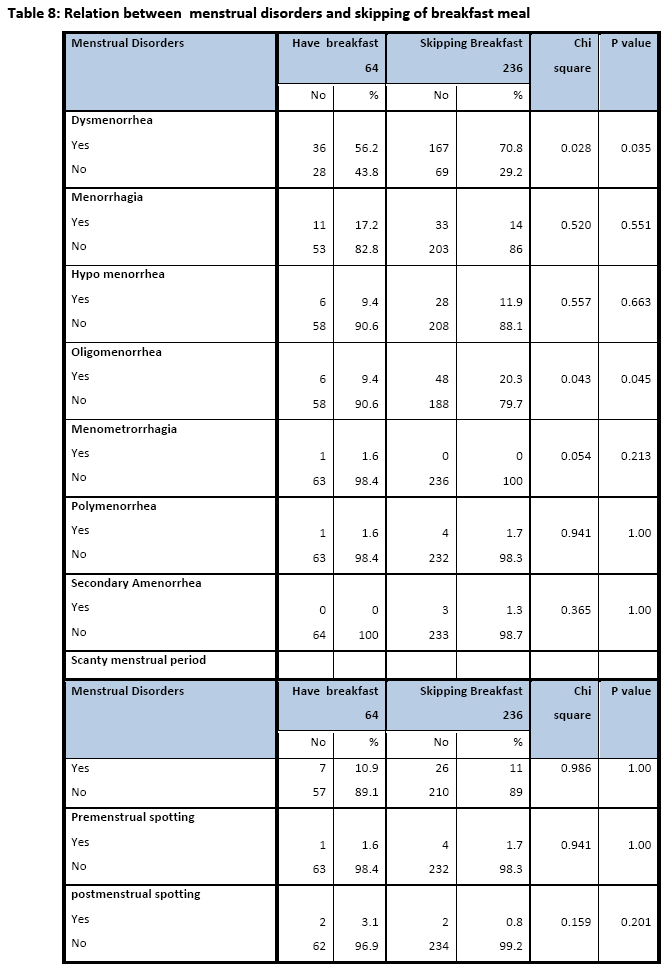
Discussion
The age of the sample in the current study recruited from young female in faculty of nursing, Menoufiya university ranging from 17 to 22 years old. Fujiwara [22] who studied skipping breakfast is associated with dysmenorrhea in young women in Japan, reported that; subjects were recruited from young Japanese female students of Ashiya College whose ages ranged from 18 to 20 years.
About half of the current sample’s age of menarche was between 10 to12 years old and more than three quarters of the sample had regular cycle. In congruence with this study Wyshak and Frisch [23] found that; The average age of menarche in Western European countries appears to have declined over the past 150 years from over 16 to under 14 years. More than one hundred years ago, it was reported that mean and/or median menstrual cycles are between 28 to 30 days [24].
The current study showed an increasing in the percentage of menstrual regularity in group one who had breakfast (89.1%) than group two who skipped breakfast (83.9%) but it did not show a statistically significant difference and this might be because the sample size was limited. This finding prove the first hypothesis which stating “The girls who have breakfast meal have regular cycle than those who do not”. In agreement with this finding, Fujiwara and Nakata [25] who studied; skipping breakfast is associated with reproductive dysfunction in post-adolescent female college students found the incidence of irregular menses was higher in the population that skipped breakfast. On the other hand gynecologic disorders such as dysmenorrhea and irregular menstruation were associated with food intake problems [4].
The current study showed statistically significant difference between the two groups regarding the menstrual days as the range of menstrual days was within the normal range in group one (who had breakfast) than group two (p= 0.016). In support of this finding; Carpenter [26] who demonstrated that; diet, exercise and stress are widely acknowledged to affect the timing and course of pubertal development and menstrual cycle in girls.
Regarding the premenstrual syndromes; the premenstrual abdominal pain, anorexia and premenstrual cramps were decreased in group one who had breakfast than group two who skipped breakfast and was shown statistically significant difference but, there was no difference between the two groups regarding the other items of premenstrual syndromes as (premenstrual back pain, abdominal distension, breast tenderness, premenstrual depression, lack of concentration, nausea, vomiting, insomnia, and premenstrual psychological disturbance). Fujiwara et al., [27] who examined skipping breakfast adversely affects menstrual disorders in young college students estimated that; there was no apparent relationship between premenstrual symptoms and dietary habits. Also Foster [24] found that; there was no difference in the incidence of premenstrual symptoms in population who skipped breakfast and those who had breakfast, but the group that skipped breakfast showed a tendency to suffer from constipation. In addition, there was a significantly higher incidence of a self-perception of poor general health among the group that skipped breakfast.
The current study revealed that, dysmenorrhea occurs in girls who skip the breakfast meal more than those who have breakfast and show a statistically significant difference. This finding proved the second hypothesis stated that “The girls who have breakfast meal have less menstrual pain (dysmenorrhea), and less premenstrual syndromes than those who do not”. This finding is supported by Foster [24] who suggested that; the severity of dysmenorrhea was significantly higher in the population that skipped breakfast. Also, in agreement with the current study Fujiwara [21] who studied skipping breakfast is associated with dysmenorrhea in young women in Japan; breakfast habits were classified into three groups (group I, having breakfast every morning, group II, having breakfast one to six times per week, group III, having breakfast less than once a week,) it was also found that; group II and group III had significantly higher scores for dysmenorrhea compared with group I.
Additionally, Carpenter [26] examined skipping breakfast adversely affects menstrual disorders in young college students demonstrate that; dysmenorrhea scores were high in Groups II who skipped breakfast. Also suggest that skipping breakfast adversely affects menstrual disorders in young college students. In the same line Fujiwara and Nakata 4 who studied adverse effects of dietary habits on menstrual disorders in young women proved that; gynecological disorders such as dysmenorrhea and irregular menstruation were associated with poor diet habits.
The current study revealed that, the oligomenorrhea as a menstrual problem was reported as a major percentage in group two who skipped the breakfast meal. In agreement of this finding Gibbs et al., [28] who studied “the association of a high drive for thinness with energy deficiency and severe menstrual disturbances: confirmation in a large population of exercising women” found that; menstrual disturbances such as amenorrhea and oligomenorrhea was observed in the high-DT group (drive-for-thinness) . Additionally, menstrual dysfunction is a common feature of all eating disorders and results in significant medical complications [29]. Exercise-induced or athletic menstrual dysfunction (amenorrhoea, oligomenorrhoea, anovulation, luteal phase deficiency, delayed menarche) was more common in active women and can significantly affect health and sport performance [30].
Conclusion
Based on the study finding there was increase in the percentage of menstrual regularity in group one who had breakfast (89.1%) than group two who skipped breakfast. The premenstrual abdominal pain, anorexia and premenstrual cramps were decreased in group one who had breakfast than group two and showed statistically significant difference, but there is no difference between the two groups regarding other items of premenstrual syndromes. Additionally, The current study revealed that dysmenorrhea occurs in female students who skipped the breakfast meal more than those who took breakfast and showed statistically significant difference.
Recommendation
Encouragement of the provision of free healthy breakfast meal to the female students at school and colleges. Evaluation of breakfast skipping should be carried out in perspective of future reproductive functions. This problem need to be examined with large sample size. Development of educational programs to increase awareness about the importance and effect of breakfast on target girls from different ages.
2628
References
- Imayama I, Alfano CM, Kong A, Foster-Schubert KE, Bain CE, Xiao L et al. Dietary weight loss and exercise interventions effects on quality of life in overweight/obese postmenopausal women: a randomized controlled trial. Int J Behav Nutr Phys Act 2011;8:118.
- Stefanick M, Mackey S, Sheehan M, Ellsworth N, Haskell W, Wood P. Effects of diet and exercise in men and postmenopausal women with low levels of hdl cholesterol and high levels of LDL Cholesterol. The New England Journal Of Medicine 1998; 339:12-20.
- Wood P, Stefanick M, Williams P, Haskell W. The effects on plasma lipoproteins of a prudent weight-reducing diet, with or without exercise, in overweight men and women. N Engl J Med 1991;325(7):461-466.
- Fujiwara T, Nakata R. (Current problems of food intake in young women in Japan: their influence on female reproductive function. Reprod Med Biol 2004; 3: 107-14.
- Fujiwara T, Sato N, Awaji, Sakamoto H , Nakata R. Adverse Effects of Dietary Habits on Menstrual Disorders in Young Women, The Open Food Science Journal 2007; 1, 24-30
- Cerin A, Collins A, Landgren BM, Eneroth P. Hormonal and biochemical profiles of premenstrual syndrome. Acta Obstet Gynecol Scand 1993; 72: 337-43.
- Chin H. On call- obstetrics & Gynecology, 3rd edition, Saunders Elsevier, 2006
- Ferin M. The menstrual cycle: an integrative view. In: Adashi EY, Rock JA, Rosemwaks Z. Ed, Reproductive Endocrinology, Surgery, and Technology. Lipincott-Raven, Philadelphia 1996; 103-21.
- Hassib F. Basic gynecology. 6th edition, Commercial press, Egypt, 2007.
- Clark L, Schlosser P, Selgrade J. multiple stable periodic solutions in a model for hormonal control of the menstrual cycle. Bulletin of Mathematical Biology 2003;65, 157-173.
- Karout N, Hawai SM, Altuwaijri S. Prevalence and pattern of menstrual disorders among Lebanese nursing students. East Mediterr Health J 2012 ;18(4):346-52.
- Cakir M, Mungan I, Karakas, T, Girisken, I, Okten A. Menstrual pattern and common menstrual disorders among university students in Turkey, Pediatrics International 2007; 49(6):938-42.
- Website: Stöppler M. Premenstrual syndromes. E-Medicine Health 2013;Augst:22, https://www.medicinenet.com/premenstrual_syndrome/article.htm (Date of access 6/9/2013)
- Smith S, Schiff I. The premenstrual syndrome; diagnosis and management. Fertil Steril 1989; 52: 527-543.
- Berkey C, Rockett H, Gillman M, Field A, Colditz G. Longitudinal study of skipping breakfast and weight change in adolescents, International Journal of Obesity 2003; 27:1258–1266.
- Abalkhail B, Shawky S.Prevalence of daily breakfast intake, iron deficiency anaemia and awareness of being anaemic among Saudi school students. Int J Food Sci Nutr 2002 ;53(6):519-28.
- Rampersaud G, Pereira M, Girard B, Adams J, Metzl J. Breakfast habits, nutritional status, body weight, and academic performance in children and adolescents. J Am Diet Assoc 2005; 105: 743-60.
- Niemeier H, Raynor H, Lloyd-Richardson E, Rogers M, Wing RR. Fast food consumption and breakfast skipping: predictors of weight gain from adolescence to adulthood in a nationally representative sample. J Adolesc Health 2006; 39: 842-9.
- Schweiger U, Tuschl R, Platte P, Broocks A, Laessle R, Pirke K. Everyday eating behavior and menstrual function in young women. Fertil Steril 1992;57(4):771-5.
- Bendich A. The potential for dietary supplements to reduce premenstrual syndrome (PMS) symptoms. J Am Coll Nutr 2000; 19: 3-12.
- Fujiwara T. Diet during adolescence is a trigger for subsequent development of dysmenorrhea in young women. Int J Food Sci Nutr 2007;58:437-44.
- Fujiwara T. Skipping breakfast is associated with dysmenorrhea in young women in Japan 2003; 54: 505-509.
- Wyshak G, Frisch R. Evidence for a secular trend in age of menarche. N Engl J Med 1982; 306: 1033-1035. York Med J; 49: 610-611.
- Foster F. The periodicity and duration of the menstrual flow. York Med J 1889: 49: 610-611.
- Fujiwara T, Nakata R. Skipping breakfast is associated with reproductive dysfunction in post-adolescent female college students. J. appet 2010; 55(3):714-7.
- Carpenter S. Psychosocial menstrual disorders: stress, exercise and diet's effect on the menstrual cycle. Curr Opin Obstet Gynecol 1994 ;6 (6):536-9.
- Fujiwara T, Sato N, Awaji H, Sakamoto H, Nakata R. Skipping breakfast adversely affects menstrual disorders in young college students. Int J food Sci Nutr 2009; 60 (6): 23-31.
- Gibbs J, Williams N, Scheid J, Toombs R, De Souza M. (2011): The association of a high drive for thinness with energy deficiency and severe menstrual disturbances: confirmation in a large population of exercising women. Int. J. Sport Nutr Exerc Metab 2011;21(4):280-90.
- Vyver E, Steinegger C, Katzman D. Eating disorders and menstrual dysfunction in adolescents. Ann N Y Acad Sci 2008 ;1135:253-64.
- Manore M. Dietary recommendations and athletic menstrual dysfunction. Sports Med 2002 ;32(14):887-901.













